
Recently, Qiao Botao, a researcher at the Research Institute of Catalysis and New Materials, Dalian Institute of Chemical Physics, Chinese Academy of Sciences, and Zhang Tao, a member of the Chinese Academy of Sciences, have made new progress in the study of single atom catalysis. The catalyst not only has high activity, but also has intrinsic anti-coking performance. Studies have revealed that CH4 incompletely dissociates at the active site of Ni single atoms, avoiding the formation of C species and the formation of carbon deposits from the source.
Carbon dioxide (CO2) and methane (CH4) are the two most important greenhouse gases in nature. They are also two cheap carbon resources that exist in large quantities. Methane carbon dioxide dry reforming converts methane and carbon dioxide into synthesis gas, which can be used in the subsequent fine chemical synthesis and Fischer-Tropsch reaction. Pt group metals all exhibit higher activity in this reaction, but the high cost of precious metals limits their practical application. Ni metal has the same activity as noble metal and has good application prospects, but Ni-based catalysts are prone to carbon deposition and lead to catalyst deactivation. Therefore, the development of Ni-based catalysts resistant to carbon deposition has become the most active and challenging research direction in this field. One.
The study found that both hydroxyapatite (HAP) -loaded single atoms and nanocatalysts were quickly deactivated during the reaction, but the deactivation mechanism was completely different. The deactivation of the nano-catalyst is mainly due to the carbon deposition of the catalyst, but there is no carbon deposition on the single-atom catalyst, and its deactivation originates from the sintering of the single atom. Therefore, after adding cerium oxide to stabilize the single atom in the single atom catalyst, the stability of the catalyst is greatly improved. The research combined with theoretical calculations shows that after dehydrogenating CH4 to CH3 species on a single-atom catalyst, it can directly combine with the dissociated O of CO2 to generate CH3O species, and then gradually dehydrogenate to CO. The entire process avoids the generation of carbon species and thus has intrinsic anti-coking properties.
This research provides new ideas for the development of a new type of highly stable anti-coking methane dry reforming catalyst, and the relevant results are published in Nature-Communication. Relevant work was supported by the National Natural Science Foundation of China, the Strategic Leading Science and Technology Project of the Chinese Academy of Sciences (B) "Essence and Regulation of Energy Chemical Conversion", the National Key R & D Program "Nano Science and Technology" Key Project, the Chinese Academy of Sciences Clean Energy Research Institute Cooperation Fund, and the Xingliao Program Funding for young talent projects.
With the constant improvement of economic level, people` requirements on the quality of paper are increasing high. A great number of paper products must have excellent resistance to fracture under moist state, in other words, must have a certain degree of wet strength. While the traditional papermaking wet strength agents are urea resin and melamino-formaldehyde, both belonging to formaldehyde resin with intense pungent smell and certain toxicity, and can be used in acid condition to acquire the wet strength. However the whiteness will descend a lot and the paper will be weak after the finished paper acquiring the wet strength. Polyamide polyamine epichlorohydrin resin (PAE) is water soluble, cationoid and thermosetting resin. This product is a non-formaldehyde polymer, non-toxic and tasteless, with a wide range of PH value and suitable for acid, neutral or slightly alkaline papermaking conditions, as well as the acid condition. Wet strength effect is better than the urea-formaldehyde resins and melamine formaldehyde resin. PAE resin, which is an excellent Wet Strength Agent, develops fast in recent years with China`s paper industry development.
The high performance papermaking wet strength agent (PAE) that we produced has been widely used in a great amount of domestic factories and the finished paper products` wet strength index has surpass the similar products in domestic and foreign counties.

1. Performance Indicators
|
Item |
Indicator |
|
Appearance |
Light yellow to light amber translucent liquid |
|
Solid content,% |
25 |
|
Viscosity mpa.s (25℃) |
25~70 |
|
PH value |
4.0~6.0 |
|
Density kg/l |
1.03 |
|
Ion type |
Cationic |
|
Ice point (℃) |
-1℃ |
|
Storage period (under normal temperature) |
≥90 |
|
Solubility |
Diffluent in cold water |

2. Application
PAE active ingredient is polyamide epichlorohydrin thermosetting resins that can be used as below:
1. Paper products with the need for drying or wiping water, such as: napkins, wet tissue paper, facial tissue, paper napkins, kitchen towels, wiping window paper, industrial wipes, lens wiping paper, cosmetic paper etc.;
2. Outdoor paper: such as kraft paper, packing paper, outdoor poster paper, construction paper, sack paper, map paper, germinating paper, fruit bag paper;
3. Wet wrapping materials: such as paper cups paper, meat paper, wrapping paper and boxes for fruits and vegetables, frozen and refined food packaging paper, pressure sensitive copy paper, filter paper, leaching processing paper and tea bag paper;
4. Paper soaked in water: as photographic raw paper. Instead of disposable textile products, such as hospital bed sheets, toilet paper and other disposable hospital garb.
Other issues such as cigarette paper, paper used for invoices.
PAE, as wet strength agent excellent efficiency (PAE), has been widely accepted by the papermaking industry
5. Storage Condition
Storage: Avoid direct sunlight, prohibiting contact with concentrated acids. Storage temperature is 0 ~ 35 ℃and the product can be stored for up to 3 months under 5 ~ 35 ℃.
4.Package and Transportation Safety
Package: 200 kg polyethylene barrels or 1000 kg IBC barrels.
Transportation: The product is non-flammable, non-explosive and low corrosive and non-dangerous. It can use plastic buckets as containers on railways, highways, aviation, marine to achieve the purpose of the safe transport, and if the leaking occurs during transportation, you can simply rinse on the spot.
Wet Strength Agent
Wet Strength Agent,Polyamide Epichlorohydrin Resin,WSR,Wetting Strength Agent
Shandong Tiancheng Chemical Co., Ltd. , https://www.akdchemical.nl
